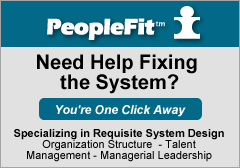Playing the Character Card Exclusively – Let’s Get a New Deck
By Michelle Malay Carter on December 9, 2007
 Clemson University professor of management, Terry Leap, wrote an Article in the Wall Street Journal entitled, Keys to Spotting a Flawed CEO,?which gave a list of behaviors which should call into question a CEO’s character.?
Clemson University professor of management, Terry Leap, wrote an Article in the Wall Street Journal entitled, Keys to Spotting a Flawed CEO,?which gave a list of behaviors which should call into question a CEO’s character.?
Michael McKinney’s Leading Blog featured the list of suspect behaviors,?and I, as a commenter, suggested that some of the behaviors might be emanating from a CEO having inadequate cognitive capacity relative to?his role, rather than a character flaw per se.? Meaning, if this?”flawed CEO”?were put into a role suited to his current capability, those derailment behaviors might cease or lower? dramatically.?
I used this same line of reasoning in another blog post?when analyzing the Fast Company article, Ten Habits of Incompetent Managers.? The crickets chirped, and no one commented so I’ll try stirring the soup again, using a slightly different angle.
Michael of Leading Blog?and one of his readers weren’t having my explanation.? They believe the situation to be solely about character – an unchecked ego.? Granted,?ego?will fuel?many of the behaviors in question, and ego flares will cause?inappropriate behavior, but I want to stop short of labeling ego flares an inherent?character flaw.? Further, I want to look for systemic solutions rather than psychoanalytical ones.?
The question not being asked is:? Can organizations design systems less likely to?catalyze ego flares or any other of a variety of other stress-related coping mechanisms?
Do You Wish to Cast the First Stone?
Have you ever behaved badly at work?? Is your character flawed?? I’ll bet you can give me a list of reasons why you acted the way you did.? They wouldn’t be excuses, but explanations.? We all have certain situations that “push our buttons”, and?these situations can cause us to act in a ways that we later regret.??Conversely, let me ask:? When you spend time with your friends, doing things you enjoy, are you prone to selfish, childish, egotistical, defensive, bullying or passive-aggressive?behavior??
We cannot deny that the environment within which we are operating is a catalyst for our behavior – laudable and regrettable.? Yes, some people are more mature than others.??Highly developed individuals are?able to keep their behavior aligned with their core principles in the face of button pushing, and I am not arguing that we all, including CEOs, should not strive to develop our character.
Current Management Systems Compel Button-Pushing?
What I am saying is that current management systems,?absolutely compel incessant?employee button pushing to include the buttons of the CEO.? First and foremost, mismatching employee cognitive capacity to role complexity will not only push the employee’s buttons, but that of their manager, peers and direct reports.? It’s a petri dish for dysfunction.? So the system-level solution lies in understanding work levels and human problem solving capability and designing processes to better match the two.??It’s downright cruel to?ask employees to be accountable for controlling disease when the organization has not first installed indoor plumbing!
Am?I a Bad Girl?? Or?Am I a Human?Who?Behaved Badly in a Frustrating, Dysfunctional Situation?
When we spot regrettable behavior,?can we look to the system FIRST before?labeling people?? Any of us who have ever acted poorly at work would appreciate this concession.??I was fired from my first job out of college.? My boss?called me?lazy and said I would never amount?to anything.??Did I have an inherent laziness character flaw?? No.? I was bored and?being asked to spend my time on tasks I wasn’t hired to do and didn’t value.??My lack of interest in my job led me not to apply myself so my slack-off behavior was contextual, not inherent.? Did I handle things well? ?No.? Was I?immature?? Yes.? But I honestly believe that had I been matched to a role that challenged me with work I valued, I would have been a star performer as I have been in other contexts.
Dysfunctional employee, manager, and CEO behavior can usually be traced to something other than an inherent character flaw.? Our current diagnostic deck of cards contains only causes rooted in individuals.? Let’s stack the deck with system-level causes, and our interventions might actually net results.
I’m OK.? You’re OK.? Let’s fix the system.
Has your character ever been called into question at work?
Filed Under Employee Engagement, Executive Leadership, Managerial Leadership, Organization Design, Requisite Organization, Talent Management
Comments
2 Responses to “Playing the Character Card Exclusively – Let’s Get a New Deck”

Ian McDonald corrected my story about the smelter. Apparently, after reorganizing along Requisite / Natural lines, social services saw a 30-40% reduction in domestic violence reports. If it is about character, then who is guilty for these if they can be prevented by doing something? Sure, we are all responsible for our actions but why are the people who own the system responsible for their inactions to prevent these problems?
Maybe there’s a more difficult question here: are the character flaws that these folks identified actually part of what makes for good CEOs in certain situations, and then terrible CEOs in others?
Thanks for the comment Forrest. It’s good to hear from you. Those are some good questions.
I’ve often wondered, Is it ignorance or arrogance that leads executives to continue to blame individual employees rather than implementing a system level solution?
Regards,
Michelle